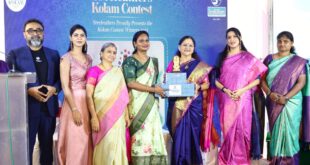ORNATE India is a multidisciplinary , multifaceted UK – India collaborative study , which aims to build research capacity and capability in India and the UK to tackle the global burden of diabetes – related visual impairment , funded by Global
Challenges Research Fund and UKRI.
Diabetes is a worldwide epidemic . Nearly
80 % of adults with diabetes reside in low middle income countries ( LMC ) where primary care infrastructure is in its infancy , fuelling the global challenge of managing diabetes and its complications . Undiagnosed dubeles is a signiticant problem in these countries and a high proportion of people are only diagnosed when they present with diabetes – related complication.
Diabetes is fast gaining the status of an epidemic in india with more than 74 million people currently diagnosed with the disease and this is expected to increase to over 100 million by 2030 , in addition , there are approximately 44 million with undiagnosed diabetes . Diabetes is continuing to increase as a result of rapid cultural and social changes , which include : ageing populations , increasing urbanization , dietary changes , reduced physical activity and unhealthy behaviour . The prevalence of the diabetes ranges from 5-17 % , with higher levels found in the southern part of the county.
Diabetic retinopathy is the most common complication of diabetes , and if left untreated leads to visual loss , it is emerging as a leading cause of vision impairment in working adults in India and is predicted to increase from 4.21 million in 2020 to 6.08 million by year 2030 , Early detection and prompt treatment will enable prevention of diabetes – related visual impairment . As in most LIMIC , there are no systematic national or state – wide screening programmes for diabetic retinopathy in India.
In the UK , annual eye screening of all people with diabetes with retinal photography and prompt treatment of sight threatening diabetic retinopathy has been shown to decrease the rate of blindness . However , the technology involved is costly , requires trained manpower and is impractical as a method for screening the 74 million people with diabetes in India annually , when the major proportion of health expenses have to bome by those with the disease.
Unless dabetic retinopathy is identified early and treated , the impact of blindness on the quality of life and productivity of the Indian population will continue to have a negative impact on the nation’s economy.
We are pleased to share observations from the 50 – month ORNATE India project , a mult – cante study on Diabetes and Diabetic Retinopathy in India funded by the UKRI Global Challenge Fund . The study has generated very valuable India – centric evidence on diabetes and diabetic retinopathy care in India that has policy implications.
 Expressnews
Expressnews








